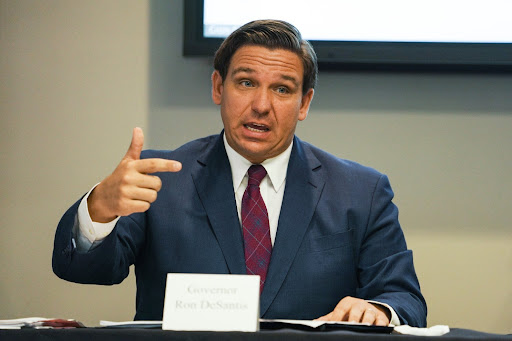DeSantis v Disney

Image courtesy of The Los Angeles Times
By Anthony Dryden
An ongoing battle between Florida governor Ron DeSantis (R) and the Burbank-based Walt Disney Company culminated Friday, April 22, with DeSantis signing a bill to strip the company of its self-governing status. The conflict between DeSantis and Disney was sparked by the company’s public condemnation of Florida House Bill 1557, The Parental Rights in Education Act, also known as the “Don’t Say Gay” bill. This legislation restricts teaching children in grades K through 3 about issues concerning sexual orientation and gender identity. The recently signed bill regarding Disney would revoke the self-governing ability of the Reedy Creek Improvement District, roughly 25,000 acres of land, within which Disney World is situated, by June of 2023.
This 55-year-old provision in Florida law allowed Reedy Creek and a few other similar districts to essentially govern themselves, but why is this the case? As a recent Politico article reports, “The reason special districts were created was so that taxpayers who don’t benefit from the services of the special district aren’t required to pay for it through taxes.” What do these services of special districts entail? These include services such as maintenance of infrastructure, power, water, and fire protection, services which are typically provided by the municipality. These services are provided to the two cities under the jurisdiction of Disney known as Bay Lake and Lake Buena Vista, which have a population of 53 people.
The bill does not permanently revoke this special district status to Disney. The company would be able to request the special district to be reestablished after June 1, 2023. Whether state legislators in Tallahassee would approve this request is a different story to ponder.
Nonetheless, what are the larger implications of this story which is currently unfolding? It seems that companies going political are not popular at all. In the overly charged political atmosphere these days, all aspects of society have become politicized. Companies and corporations are not exempt from this. Whether this is out of fear of political repercussions or deference is for the reader to decide. Nonetheless, companies such as Netflix have been releasing products catered to a more politically left-leaning audience for years. Films such as ‘Desire’, ‘Baby’, and ‘Cuties’ received extreme backlash from some citizens while receiving mostly positive reviews from critics. Each one of these movies puts young girls into overly sexualized situations, causing some to accuse Nexflix of peddling pedophilia. This backlash has not gone unnoticed in terms of the stock market. As of April 20, Netflix’s stock is down 62%, according to The Wall Street Journal. Netflix lost 200,000 subscribers in the first quarter of the fiscal year.
What about Disney? When asked about the possibility of the bill passing on Wednesday, the company declined to comment. The company’s stock has dropped 15%, becoming one of the worst actors in the Dow Jones Industrial Average. It appears as if Disney’s stock has not taken as massive of a hit compared to Netflix, but this may change if Disney does not find a way to mediate its way through the heated political scene.
In terms of party politics, this situation has made for some interesting developments. Generally in the past, the political left has been among those who are angered when companies, or even people affiliated with those companies, did things they disagreed with politically. In terms of the political right, there has been a general attitude of not wanting to punish corporations as long as they do not involve themselves in issues unrelated to their purview. This type of attitude can be seen in the Masterpiece Cakeshop controversy. It appears that the right sees Disney’s actions as involving itself in an issue unrelated to itself.
It is also interesting to see the sudden changes happening in the Democratic party, caused by DeSantis’ response to Disney. It is no secret that the Democratic party advocates for more regulation and higher taxes on corporations. However, as the saying goes, politics makes strange bedfellows. The Democratic party has rallied behind Disney. MSNBC’s Symone Sanders (who worked as Senator Bernie Sanders’s press secretary in his 2016 presidential run and for the White House until recently) commented on the situation stating, “My money is on the Disney lobbyists.”
The battle between DeSantis and Disney has far-reaching effects, which even more highlight how the relationship between politics, citizens, and the company is changing. In the end, corporations will have to make some hard decisions in the coming future.
Or do they…? Moreover, can they? It appears that we have forgotten to mention the elusive investment management companies. These companies own 20% of each Fortune 500 company. They manage things like pensions, IRAs, and 401ks. Disney is no exception to this. BlackRock and The Vanguard Group are big players involved with Disney. These companies use their leverage to promote what is called ESG, or “environmental, social and corporate governance” programs. A lot of these investors have proxy members on the boards of corporations that vote to implement these sorts of policies. If they do not get their way, they threaten to fire other board members. Recently, more and more red states have been pushing back by threatening to pull state money from pension funds if these big investment management companies keep pushing these types of actions that Disney has done. So, as the reader can surely see, this is a much more complex issue than it appears at first glance. Nonetheless, one can count on more situations like this will arise in the coming future.








